Yoruba is a rich and fascinating language spoken by millions of people, mainly in Nigeria and other parts of West Africa. In the SS1 first-term Yoruba curriculum, students learn the basics of Yoruba grammar, proverbs, literature, and oral traditions.
To help SS1 students prepare effectively, this topic provides Yoruba objective questions for first-term exams. These questions cover grammar, literature, culture, and phonetics, ensuring a strong foundation for further studies.
Yoruba Language Curriculum for SS1 First Term
Before practicing objective questions, let’s review the key topics covered in SS1 first-term Yoruba studies:
🔹 Yoruba Alphabets and Pronunciation
🔹 Word Formation and Sentence Structure
🔹 Parts of Speech (Noun, Verb, Adjective, etc.)
🔹 Yoruba Proverbs and Their Meanings
🔹 Folktales and Oral Literature
🔹 Yoruba Culture and Traditions
🔹 Comprehension and Composition
Yoruba Objective Questions for SS1 First Term
Below are multiple-choice questions (Yoruba objective questions) based on SS1 first-term topics. Each question has four answer options, and the correct answer is indicated.
Section 1: Yoruba Alphabets and Pronunciation
1️⃣ How many letters are in the Yoruba alphabet?
- 26
- 25
- 20
- 30
✅ Answer: B (25)
2️⃣ Which of these is NOT a Yoruba vowel?
- A
- E
- Z
- O
✅ Answer: C (Z)
3️⃣ Which of these words is correctly written in Yoruba?
- Ọlọrun
- Olorun
- Olórun
- Olorún
✅ Answer: A (Ọlọrun)
Section 2: Word Formation and Sentence Structure
4️⃣ Which of these Yoruba words means “school”?
- Ile-iwe
- Ile-ewe
- Ile-ewewe
- Ile-iwewe
✅ Answer: A (Ile-iwe)
5️⃣ What is the meaning of “baba nla mi”?
- My mother
- My father
- My grandfather
- My uncle
✅ Answer: C (My grandfather)
6️⃣ Which of these is a correct Yoruba sentence?
- Mo jẹun ni ana
- Mo jẹ ni anaun
- Jẹun mo ni ana
- Mo ana jẹun
✅ Answer: A (Mo jẹun ni ana)
Section 3: Parts of Speech in Yoruba
7️⃣ What type of word is “odun” (year)?
- Noun
- Verb
- Adjective
- Pronoun
✅ Answer: A (Noun)
8️⃣ Which of these words is a Yoruba verb?
- Ile
- Sun
- Ojo
- Aja
✅ Answer: B (Sun – Sleep)
9️⃣ What does the Yoruba pronoun “wọn” mean?
- We
- They
- You
- He
✅ Answer: B (They)
Section 4: Yoruba Proverbs and Meanings
10️⃣ “Bi a ba fi oju bale, a o gb’epo lenu” means?
- Hard work leads to success
- Respect brings rewards
- He who plays with fire gets burnt
- Silence is golden
✅ Answer: B (Respect brings rewards)
11️⃣ Which Yoruba proverb means “A bird in hand is worth two in the bush”?
- Owe l’esin oro
- Bi igba ko ba jina, a ri eru e
- Ọwọ́ tí ó bá fi ewé ké a máa wó
- Eni tí ó ní ká, ó yẹ kí ó ká ara rẹ̀
✅ Answer: B (Bi igba ko ba jina, a ri eru e)
Section 5: Yoruba Folktales and Oral Literature
12️⃣ What are “Alo Apamo” in Yoruba literature?
- Proverbs
- Riddles
- Legends
- Songs
✅ Answer: B (Riddles)
13️⃣ Which of these is a common character in Yoruba folktales?
- Tortoise (Ijapa)
- Dog (Aja)
- Lion (Kiniun)
- Snake (Ejò)
✅ Answer: A (Tortoise – Ijapa)
14️⃣ What is “Oriki” in Yoruba culture?
- A type of dance
- A form of praise poetry
- A folktale
- A spiritual song
✅ Answer: B (A form of praise poetry)
Section 6: Yoruba Culture and Traditions
15️⃣ Which of these festivals is celebrated in Yoruba culture?
- Eid-el-Fitr
- Osun-Osogbo Festival
- New Yam Festival
- Igbo Ukwu Festival
✅ Answer: B (Osun-Osogbo Festival)
16️⃣ Who is known as the “father of the Yoruba people”?
- Sango
- Oduduwa
- Orunmila
- Obatala
✅ Answer: B (Oduduwa)
17️⃣ What is the name of the Yoruba talking drum?
- Dundun
- Bata
- Gangan
- Omele
✅ Answer: C (Gangan)
Section 7: Yoruba Comprehension and Composition
18️⃣ What does “Omode gbon, agba gbon” mean?
- Children are wiser than elders
- Knowledge is power
- Both the young and old have wisdom
- Experience is better than wisdom
✅ Answer: C (Both the young and old have wisdom)
19️⃣ What is “Ile Yoruba” in English?
- Yoruba culture
- Yoruba people
- Yoruba homeland
- Yoruba language
✅ Answer: C (Yoruba homeland)
20️⃣ Which of these is NOT a Yoruba greeting?
- E ku ikale
- E ku isimi
- E ku idupe
- E ku iro
✅ Answer: D (E ku iro)
Studying Yoruba objective questions for SS1 first term helps students understand the language, grammar, proverbs, literature, and culture. These multiple-choice questions will improve preparation for exams and strengthen Yoruba language skills.
To excel in SS1 Yoruba, students should:
✅ Practice more objective questions
✅ Read Yoruba literature and folktales
✅ Memorize common proverbs and their meanings
✅ Engage in conversations using the Yoruba language
By following these tips, students will develop a deeper understanding and appreciation of Yoruba language and culture.
